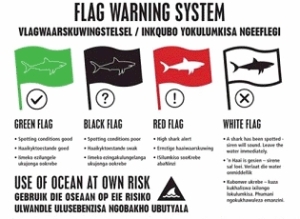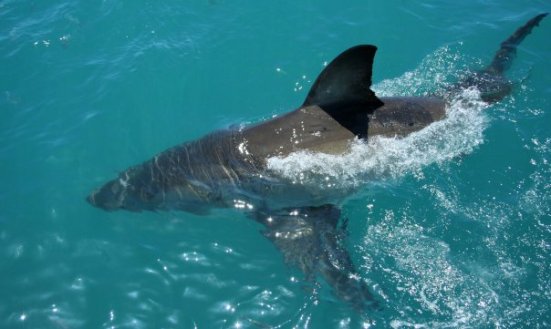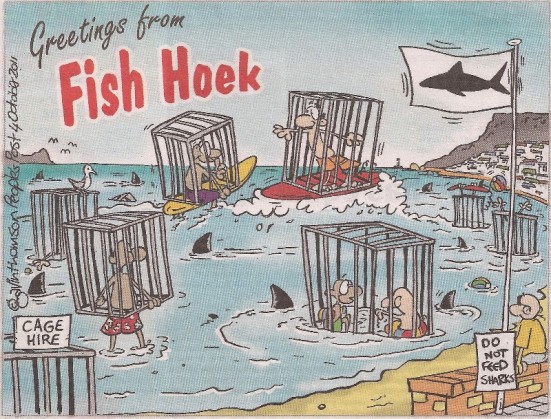After the recent shark attack in Fish Hoek, False Bay (South Africa), I was going to just add a comment to my blog Rethink the Shark from Villain to Sophisticate. However when I started writing, I decided that the issues deserve a full blog, so here I get on my shark soapbox once again.
What happened?
At approximately 12.30 hrs on Wednesday 28th September 2011, a 43 year old male, Mr. Michael Cohen, was bitten and severely injured by a Great White Shark near Clovelly Corner, Fish Hoek beach, while swimming. The victim sustained severe injuries, which included the loss of his right leg and severe damage to his left foot.
The City of Cape Town has an advanced shark warning system in place with the Shark Spotters Programme. Shark Spotters are strategically placed in elevated positions along the False Bay coastline with binos scanning the waters all day long. As soon as they spot a shark, the information is radioed through to the beach, where a siren and the white flag are raised. All water users are then requested to leave the water. Fish Hoek beach has a permanent shark spotter working 08.00-18.00 hrs in winter and 07.00-18.45 hrs in summer, 365 days a year.
The four days prior to the incident, sharks were spotted at least once a day at Fish Hoek. On the 28th September, the Shark Spotter first sighted two Great White Sharks early in the morning and the alarm was raised. Once the sharks had moved out of the bay the Red Warning Flag was raised, as per standard safety protocol.
At approximately 10.50 hrs they sighted two Great Whites and again the shark siren was sounded, the beach cleared, and the shark flag raised. At around 12.25 hrs the mountain Shark Spotter saw a swimmer enter the water near the Clovelly Corner area. The swimmer was, according to eye witnesses, in shallow water no more than 50 meters from the shore. The beach spotter began to run toward Clovelly corner to warn the swimmer, while eye witnesses saw an approximately 4 m large shark casually and slowly approached the swimmer from behind, who was totally unaware of the shark’s presence. At this point the shark attacked the swimmer once. Two local men called the emergency services and quickly entered the water, risking their own lives, to rescue the victim. A rescue helicopter arrived swiftly and the victim was taken to hospital in a critical condition.
The victim was a local man, well aware of the Shark Spotters Programme and known for ignoring all shark spotters warnings and beach closures on previous occasions.
People’s reactions
In the days after the shark attack, the media frenzy was predictable. Headlines of rogue sharks with a ‘taste for human flesh’, the need for shark nets, shark cage diving industry to blame by conditioning sharks to associate humans with food, questions like “do we kill them all?” and the future of the Great White shark once again put in serious doubt.
False Bay is home to some of the largest concentrations of sharks and fossils records have shown that they were part of the Cape marine ecosystem for 1,000’s of years. Sharks are some of the most successful predators on earth. However it takes a shark about 15 years to mature and they produce only few successful offspring. This makes them very vulnerable to certain fishing methods. Being the apex predator of the oceans, sharks play a vital role in keeping the marine ecosystem in balance.
Culling programmes, such as shark nets (gill nets designed to catch & kill sharks), drumlines, and shark hunts, are not only very expensive, but have been shown to be ineffective, and now regarded as unnecessary and old fashioned approaches. In addition, shark nets kill indiscriminately other marine animals, such as seals, dolphins, turtles, harmless sharks, and even whales.
Sharks have some of the highest environmental protection of any fish in our oceans. The great whites are fully protected in South Africa, are listed in CITES’ Appendix II, and the IUCN Red List of Threatened Species identifies the species as globally vulnerable. This begs the question whether killing sharks is not only illegal, but also highly unethical.
Alison Kock from the Save Our Seas Foundation scientific committee says “we need to look for innovative ways to reduce wildlife-human conflict” and I fully agree. However we also need to keep things in perspective. The waters around Cape Town are used daily by 100’s, if not 1,000’s, of people for fishing, surfing, kayaking, diving, and swimming. The more people use the ocean, statistically the chance of shark-human interaction increases. We take a multitude of risks on a daily basis that are fully accepted in our society, with road use generating some of the highest risks. In South Africa over the Easter holidays this year only, 203 people were killed in road accidents. Has anybody ever uttered the words of closing roads or banishing cars?
The highly regarded marine scientist, Prof. Mike Barker from New Zealand, sums it up pertinently:
“We share the oceans with these animals. The notion that we need to kill any animal that might place us at risk when we enter the water, is a totally unacceptable attitude in the modern world”.



All very factually correct and finely researched, but given the question of Great Whites – misunderstood softies or unscrupulous sea vermin? I’m afraid I’m still drawn to the latter. A few less of them in beach zones wouldn’t be such a bad thing…but they do look fab on nature documentaries, so nice to leave a few in the deep oceans.
Thank you for commenting on my blog. Sharks are migratory species that move between deeper waters and more shallow areas on a regular basis. The reasons for this are not completely understood. Fish Hoek beach seems to experience their presence more frequently in Spring time. Therefore it generally is not a year round problem for water users, but we do need to respect their presence and the measures the City of Cape Town has put into place to manage the situation. The Shark Spotters Programme is highly regarded worldwide, enabling both sharks and humans to coexist in the beach zone.
Well I am of the opinion that the sea is the natural home of the shark not ours, and he was there before we were.
Oh I meant to say, nice blog and very interesting. Keep up the good work. 🙂
Thank for your comments Jessie and I couldn’t agree more that the sharks have first right to their natural habitat.
I think we must leave the sharks alone. Especially cage diving isnt a good way to see these magnificent animals